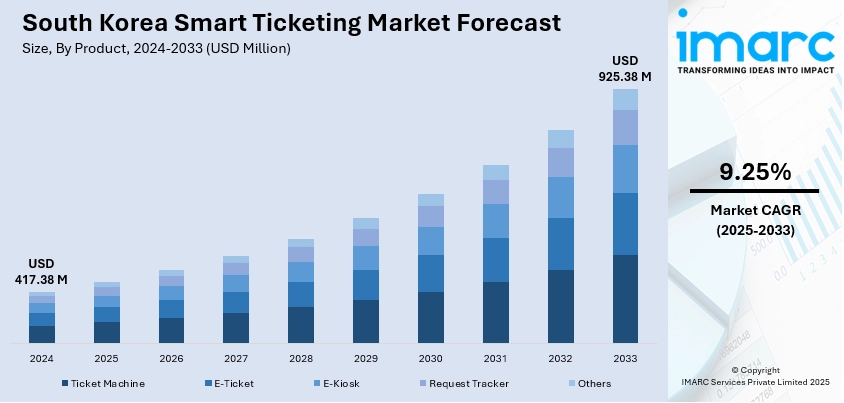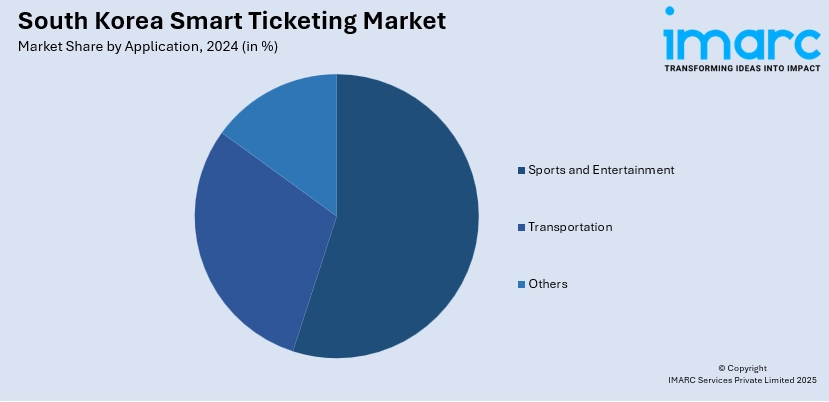
South Korea Smart Ticketing Market Size, Share, Trends and Forecast by Product, Component, System, Application, and Region, 2025-2033
South Korea Smart Ticketing Market Overview:
The South Korea smart ticketing market size reached USD 417.38 Million in 2024. The market is projected to reach USD 925.38 Million by 2033, exhibiting a growth rate (CAGR) of 9.25% during 2025-2033. The market is propelled by the rise in adoption of contactless payment technologies and digitalization across the nation. Apart from that, the increasing need for convenient and efficient ticketing systems, especially in public transportation systems, is fueling market growth. Furthermore, government policies promoting the development of smart infrastructure, and the extensive use of smartphones and mobile applications are improving the integration of these systems, thereby augmenting the South Korea smart ticketing systems market share.
|
Report Attribute
|
Key Statistics
|
|---|---|
|
Base Year
|
2024
|
|
Forecast Years
|
2025-2033
|
|
Historical Years
|
2019-2024
|
| Market Size in 2024 | USD 417.38 Million |
| Market Forecast in 2033 | USD 925.38 Million |
| Market Growth Rate 2025-2033 | 9.25% |
South Korea Smart Ticketing Market Trends:
Rise of Contactless and Mobile Ticketing Infrastructure
The industry is witnessing a significant evolution towards contactless and mobile-based infrastructure, influenced by developments in digital payment technologies and shifting consumer trends. Smart cards with contactless technology and mobile handsets with NFC capabilities are replacing paper tickets, providing commuters with an enhanced, inconvenience-free, and clean travel experience. This shift has accelerated after increased public pressure for low-contact modes and quicker processing times at access points. In addition, public transport authorities and private operators are increasingly adopting mobile wallets and QR-based ticketing into their systems, lowering operational costs and boosting system effectiveness. Mobile ticketing applications now feature real-time updates, transaction records, and fare recharges, further enhancing user interaction and transparency. One significant development is the launch by Tmoney of a pilot tagless payment system on some Seoul city bus routes, due to start in October 2025, on 36 routes involving about 580 buses. The new system uses Bluetooth Low Energy sensors to automatically deduct fares when passengers board and get off, without tapping cards or phones, while running in parallel with current tap-based payments. Besides, the rollout of contactless ticketing as part of smart city projects is also complementing the government's wider digital transformation push.

To get more information on this market, Request Sample
Emphasis on System Intelligence, Data Analytics, and Cybersecurity
The integration of data intelligence and security-focused technologies is a significant factor providing a boost to South Korea smart ticketing market growth. As digital ticketing systems generate large volumes of transactional and behavioral data, operators are leveraging analytics tools to derive actionable insights on ridership patterns, peak demand zones, and user preferences. This information plays a crucial role in maximizing route planning, load balancing, and fare policy, thus enhancing system performance and customer experience. The electronic fare collection opens up tremendous cybersecurity issues, mainly surrounding payment information, personal data, and system integrity. This is of particular importance to the smart ticketing market, where effortless digital transactions must be considered against strong security models in order to preserve the confidence of the public. According to industry reports, cyber attacks jumped by 48 percent in 2024, rising from 1,277 to 1,887 incidents, reflecting the urgency of deploying next-generation threat prevention solutions on transit infrastructure. The investments are therefore being channeled into creating secure IT designs that include encryption, multi-factor authentication, and real-time threat detection. Apart from this, public trust is a major consideration in the rollout of smart ticketing, and stakeholders are thus encouraged to strictly observe data protection procedures and compliance standards.
South Korea Smart Ticketing Market Segmentation:
IMARC Group provides an analysis of the key trends in each segment of the market, along with forecasts at the country and regional levels for 2025-2033. Our report has categorized the market based on product, component, system, and application.
Product Insights:
- Ticket Machine
- E-Ticket
- E-Kiosk
- Request Tracker
- Others
The report has provided a detailed breakup and analysis of the market based on the product. This includes ticket machine, E-ticket, E-kiosk, request tracker, and others.
Component Insights:
- Software
- Hardware
A detailed breakup and analysis of the market based on the component have also been provided in the report. This includes software and hardware.
System Insights:
- Open Payment System
- Smart Card
- Near-Field Communication
The report has provided a detailed breakup and analysis of the market based on the system. This includes open payment system, smart card, and near-field communication.
Application Insights:

- Sports and Entertainment
- Transportation
- Others
A detailed breakup and analysis of the market based on the application have also been provided in the report. This includes sports and entertainment, transportation, and others.
Regional Insights:
- Seoul Capital Area
- Yeongnam (Southeastern Region)
- Honam (Southwestern Region)
- Hoseo (Central Region)
- Others
The report has also provided a comprehensive analysis of all the major regional markets, which include Seoul Capital Area, Yeongnam (Southeastern Region), Honam (Southwestern Region), Hoseo (Central Region), and others.
Competitive Landscape:
The market research report has also provided a comprehensive analysis of the competitive landscape. Competitive analysis such as market structure, key player positioning, top winning strategies, competitive dashboard, and company evaluation quadrant has been covered in the report. Also, detailed profiles of all major companies have been provided.
South Korea Smart Ticketing Market News:
- On June 16, 2025, Tmoney partnered with Apple to enable Apple Pay for public transit across South Korea, marking the first integration of iPhone and Apple Watch payment capabilities into the country's fare systems. The initiative aligns with Tmoney's October pilot of a tagless, Bluetooth-based fare collection system on select Seoul bus routes, enhancing payment flexibility and commuter convenience. This collaboration represents a strategic advancement in the smart ticketing infrastructure, reinforcing its commitment to embracing seamless, digital-first transit payment methods.
South Korea Smart Ticketing Market Report Coverage:
| Report Features | Details |
|---|---|
| Base Year of the Analysis | 2024 |
| Historical Period | 2019-2024 |
| Forecast Period | 2025-2033 |
| Units | Million USD |
| Scope of the Report |
Exploration of Historical Trends and Market Outlook, Industry Catalysts and Challenges, Segment-Wise Historical and Future Market Assessment:
|
| Products Covered | Ticket Machine, E-Ticket, E-Kiosk, Request Tracker, Others |
| Components Covered | Software, Hardware |
| Systems Covered | Open Payment System, Smart Card, Near-Field Communication |
| Applications Covered | Sports and Entertainment, Transportation, Others |
| Regions Covered | Seoul Capital Area, Yeongnam (Southeastern Region), Honam (Southwestern Region), Hoseo (Central Region), Others |
| Customization Scope | 10% Free Customization |
| Post-Sale Analyst Support | 10-12 Weeks |
| Delivery Format | PDF and Excel through Email (We can also provide the editable version of the report in PPT/Word format on special request) |
Key Questions Answered in This Report:
- How has the South Korea smart ticketing market performed so far and how will it perform in the coming years?
- What is the breakup of the South Korea smart ticketing market on the basis of product?
- What is the breakup of the South Korea smart ticketing market on the basis of component?
- What is the breakup of the South Korea smart ticketing market on the basis of system?
- What is the breakup of the South Korea smart ticketing market on the basis of application?
- What is the breakup of the South Korea smart ticketing market on the basis of region?
- What are the various stages in the value chain of the South Korea smart ticketing market?
- What are the key driving factors and challenges in the South Korea smart ticketing market?
- What is the structure of the South Korea smart ticketing market and who are the key players?
- What is the degree of competition in the South Korea smart ticketing market?
Key Benefits for Stakeholders:
- IMARC’s industry report offers a comprehensive quantitative analysis of various market segments, historical and current market trends, market forecasts, and dynamics of the South Korea smart ticketing market from 2019-2033.
- The research report provides the latest information on the market drivers, challenges, and opportunities in the South Korea smart ticketing market.
- Porter's five forces analysis assist stakeholders in assessing the impact of new entrants, competitive rivalry, supplier power, buyer power, and the threat of substitution. It helps stakeholders to analyze the level of competition within the South Korea smart ticketing industry and its attractiveness.
- Competitive landscape allows stakeholders to understand their competitive environment and provides an insight into the current positions of key players in the market.
Need more help?
- Speak to our experienced analysts for insights on the current market scenarios.
- Include additional segments and countries to customize the report as per your requirement.
- Gain an unparalleled competitive advantage in your domain by understanding how to utilize the report and positively impacting your operations and revenue.
- For further assistance, please connect with our analysts.
 Request Customization
Request Customization
 Speak to an Analyst
Speak to an Analyst
 Request Brochure
Request Brochure
 Inquire Before Buying
Inquire Before Buying




.webp)




.webp)












